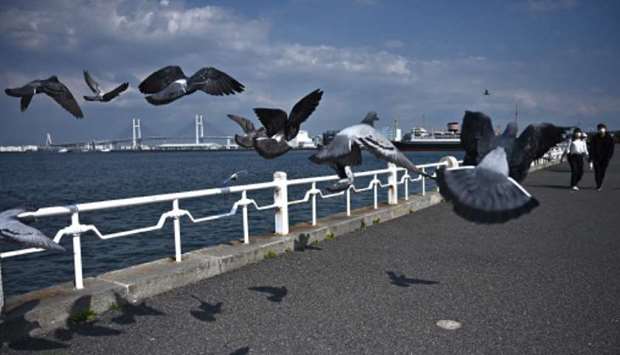Tokyo’s nightlife districts of Shibuya, Akasaka and Ginza areas were much quieter than usual overnight as the state of emergency took effect, but cities have not shut down and many workers are still commuting to offices by day.
The central bank warned that the coronavirus pandemic had created an “extremely high” level of uncertainty for the world’s third-largest economy, with regional economies facing their worst conditions since the global financial crisis a decade ago.
Japanese authorities are hoping to contain the outbreak without imposing a mandatory lockdown that could deal a major blow to an economy already struggling to cope.
The state of emergency gives local governors stronger legal authority to urge people to stay home and businesses to close. In contrast to lockdowns in some countries enforced by fines and arrests for non-compliance, Japan is relying more on peer pressure and a tradition of respect for authority.
Japan, where a cruise ship offshore was once the biggest source of infections outside China, had early success in limiting the coronavirus. But authorities have become more alarmed in recent weeks by a surge in local transmission.
The number of infections rose by 384 yesterday to 5,356, while the death toll edged up by 1 to 106, according to NHK.
During a daily live YouTube broadcast, Tokyo Governor Yuriko Koike said the capital had 181 new cases yesterday, the highest daily jump. “I am asking for your co-operation to protect your life, protect your family, protect your colleagues and society” she said. While Tokyo and the central government have been discussing what kind of businesses they will ask to close, Koike is considering making her own decision if they fail to reach an agreement, Kyodo news agency reported.
Hideaki Omura, governor of Aichi prefecture, which includes the city of Nagoya and hosts Toyota Motor Corp, said he would declare a state of emergency today even if the central government did not add it to the national list.
“If we watch what’s happened in the last week it doesn’t look good and so we’re making preparations,” he said. Chief Cabinet Secretary Yoshihide Suga said in an afternoon press briefing that there was no need now to add Aichi and other areas to the national list.
Even with less stringent restrictions compared with other countries, analysts polled by Reuters expect Japan to slip into a deep recession this year.
While aggressive central bank actions across the globe have eased financial market tensions somewhat, corporate funding strains were worsening, Bank of Japan Governor Haruhiko Kuroda told a quarterly meeting of regional branch managers.
“The spread of the coronavirus is having a severe impact on Japan’s economy through declines in exports, output, demand from overseas tourists and private consumption,” he said.
“For the time being, we won’t hesitate to take additional monetary easing steps if needed, with a close eye on developments regarding the coronavirus outbreak.”
The BOJ cut its assessment on all of Japan’s nine regions for the first time in 11 years, saying their economies were weakening or under strong downward pressure.
“The situation is quite severe. Business sentiment is souring. Firms dealing with inbound tourism and consumption are seeing sharp declines in sales,” Yasuhiro Yamada, the BoJ’s Osaka branch manager overseeing the Kinki western Japan region, told a news conference.

